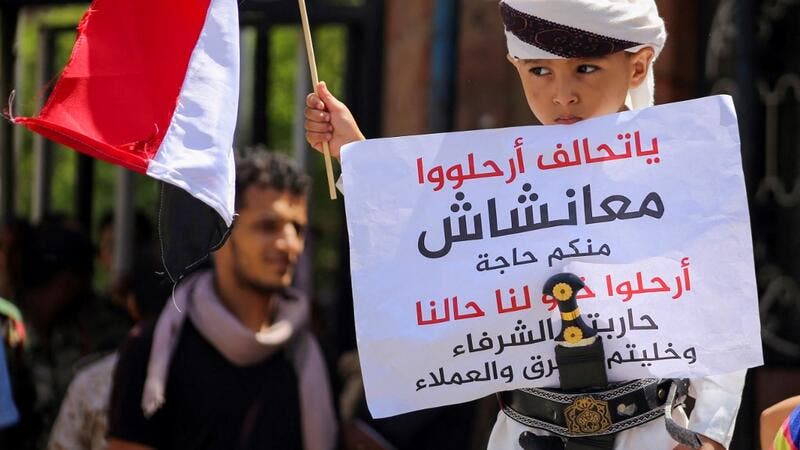


US Special Envoy for Yemen, Tim Lenderking, emphasized the urgent need for a ceasefire by the Houthi rebel group during a press briefing. He warned that Houthi attacks in the Red Sea are jeopardizing the ongoing peace process in Yemen and hindering crucial humanitarian aid to the region. Lenderking's discussions in Oman and Saudi Arabia included commending Oman's efforts in facilitating peace talks and engaging with regional partners. He called for a halt in Houthi attacks to refocus on the Yemen peace process and address the legitimate aspirations of the Palestinian people for a two-state solution.
Yemen: Urgent Call for Ceasefire as Houthi Attacks Threaten Peace
Background
Yemen has been embroiled in a devastating civil war since 2014, pitting the internationally recognized government supported by Saudi Arabia against the Iran-backed Houthi rebels. The conflict has created a humanitarian crisis, with millions facing hunger and displacement.
US Envoy's Warning
US Special Envoy for Yemen, Tim Lenderking, has issued an urgent call for a ceasefire by the Houthi rebels. He emphasized that their attacks in the Red Sea are jeopardizing the ongoing peace process and hindering humanitarian aid.
Lenderking's discussions in Oman and Saudi Arabia focused on commending Oman's efforts in facilitating peace talks and engaging with regional partners. He called for a halt in Houthi attacks to allow the peace process to proceed.
Houthi Attacks and Peace Talks
The Houthi rebels have been launching cross-border attacks on Saudi Arabia and the Red Sea. These attacks have damaged infrastructure and disrupted shipping lanes, threatening regional stability.
The peace talks, brokered by the UN, have been struggling to make progress due to ongoing fighting and disagreements between the parties. The US has been pushing for a comprehensive ceasefire as a first step towards a political solution.
Top 5 FAQs and Answers
1. Who are the Houthi rebels?
The Houthis are a Zaidi Shia Muslim group that emerged in northern Yemen in the 1990s. They have gained significant territory and influence since the start of the civil war.
2. What is the role of Saudi Arabia and Iran in the conflict?
Saudi Arabia supports the internationally recognized government and has led a coalition of countries in airstrikes against the Houthis. Iran has provided military and financial support to the Houthis.
3. What is the humanitarian crisis in Yemen?
The conflict has created a severe humanitarian crisis. Millions of people are facing hunger, malnutrition, and displacement. The country also has the world's worst cholera outbreak.
4. What is the current status of the peace talks?
The peace talks have been on hold since October 2021 due to disagreements between the parties. The US and other international actors are working to revive the talks.
5. What is the US's role in Yemen?
The US is the primary supporter of the Saudi-led coalition and provides military assistance. It has also been involved in diplomatic efforts to end the conflict.

Russian President Vladimir Putin visits India for a 27-hour trip to meet Prime Minister Narendra Modi and discuss a wide range of topics. The two leaders had a private dinner where they set the tone for the official summit talks the following day. During the talks, PM Modi announced a 2030 Economic Cooperation Programme and discussed economic and energy cooperation with Putin. Additionally, they also emphasized the need to jointly combat terrorism and find a peaceful resolution to the conflict in Ukraine.

In a shocking development, it has been discovered that the bodies of several victims repatriated to the UK following the Air India crash in Ahmedabad were found to contain dangerous levels of formalin, carbon monoxide, and cyanide. This was revealed by Professor Fiona Wilcox, who is leading the investigation into the deaths of 53 British nationals in the crash. The report highlights the lack of awareness about the dangers of formalin exposure in morgues across the UK, putting mortuary staff at risk. Immediate measures have been taken to mitigate the danger, but the report raises concerns about the handling of bodies in such facilities.

Russian President Vladimir Putin and Indian Prime Minister Narendra Modi met in India for discussions on strengthening their countries' strategic partnership. This meeting comes at a time when Russia and India are facing increasing pressure from the United States, with the US imposing tariffs on Indian purchases of Russian oil and Russia's ongoing conflict with Ukraine. Despite these challenges, Modi and Putin have maintained a strong personal relationship and are seeking to deepen their cooperation.

Russian President Vladimir Putin's visit to India has garnered significant attention as it takes place amidst strained relations between India and the US. His 27-hour visit included a ceremonial welcome at the Rashtrapati Bhavan, laying a wreath at Rajghat and taking part in a dinner with PM Modi. The highlight of the visit was PM Modi's gift of a copy of the Bhagavad Gita in Russian, emphasising the cultural and philosophical bonds between the two countries.

The Pakistani government has come under heavy criticism after images claiming that their relief aid to Sri Lanka contained expired products went viral on social media. The supplies, intended for families affected by Cyclone Ditwah, were sent as emergency assistance but were found to have an expiry date of October 2024 printed on the packaging. This discovery has sparked outrage and disbelief, with netizens slamming the Pakistani authorities for their insensitivity and lack of attention to detail.

Thousands of passengers, including Tamilians and other Indian nationals, have been trapped at the Bandaranaike International Airport in Colombo for the past few days due to the devastation caused by Cyclone Ditwah. The Indian High Commission has reaffirmed its commitment to helping its neighbor by delivering urgent humanitarian aid and disaster relief through Operation Sagar Bandhu. Along with providing relief materials, the Indian government is also coordinating with the Sri Lankan government to facilitate the safe return of stranded passengers. Meanwhile, Prime Minister Narendra Modi has expressed sorrow over the loss of lives in Sri Lanka and has promised immediate support from India.

Amidst a fragile ceasefire, Israel carried out a targeted airstrike in the Lebanese capital of Beirut, killing five people and injuring dozens more. The strike was ordered by Israeli Prime Minister Benjamin Netanyahu and has drawn criticism from both the Hezbollah and the Lebanese President. This attack marks a significant escalation in tensions between Israel and Hezbollah, who have been in a state of war for almost two years.

Rajnath Singh spoke at a public event where he reinstated the key role that cultural bonds play in India's global hegemony and asserted Sindh's continued significance to Indian heritage Seeing the ever stronger connection between Sindh and India that has recently seen acknowledgement from the people of Pakistan-occupied Kashmir themselves, in the coming years boundaries could realign providing a pathway for Sindh to once again be a part of India.

Indian Prime Minister Narendra Modi arrived in Johannesburg for the G20 Leaders’ Summit in South Africa, where he will engage in bilateral meetings and participate in the IBSA Summit. This marks the first time the G20 is being held in Africa, with the focus being on building solidarity, equality, and sustainability. PM Modi also expressed his excitement to meet with the Indian diaspora in South Africa, highlighting their strong presence in the country. He will present India's perspective on global issues, emphasizing the country's vision of 'Vasudhaiva Kutumbakam' (the world is one family).

As India commemorates its Independence Day in 2025, it's important to share the spirit and pride of this special day with the world. From inspiring morning messages to beautiful patriotic images, this collection offers the perfect words and visuals to show your love for India. Whether it's through WhatsApp, Instagram, or other social media platforms, spread the joy and gratitude for your country on this momentous day.